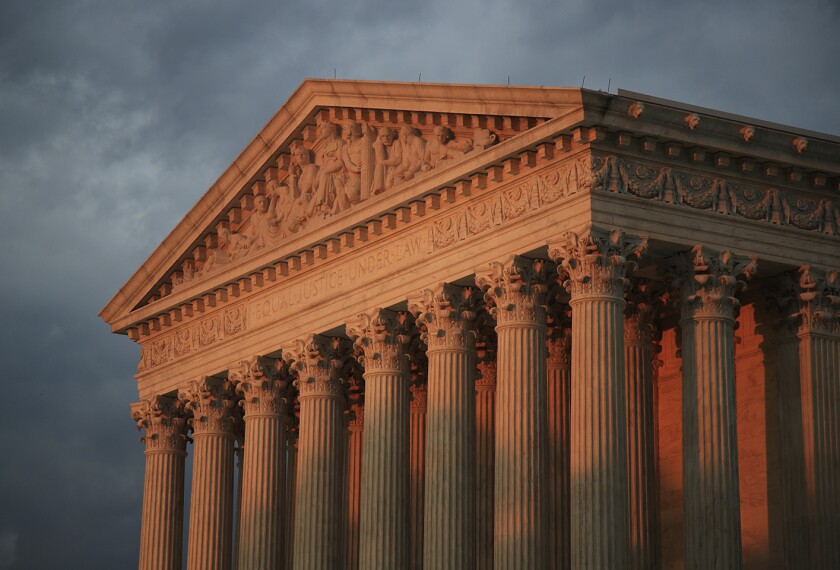Alabama may be in the Bible Belt, but some there are finding that creating a state-approved course for public schools on the Good Book might not be easy.
Leaders of the state House of Representatives have introduced a bill that endorses an elective high school course that uses a new textbook outlining the Bible’s influence in literature and history.
Some lawmakers and Christian activists are asking whether it’s appropriate for the legislature to prescribe which curriculum on the Bible schools should use.
But when it comes to teaching about the Bible, according to the bill’s supporters, state legislators should approve a curriculum as a way of assuring local officials that the program does not violate laws on religious instruction in public schools. That’s why the Alabama bill would endorse The Bible and Its Influence over other programs that use the Bible as a textbook, backers say.
“[The curriculum] ties together the Bible with specific events and characters in our history,” Dr. Randy Brinson, a Montgomery, Ala., physician and a backer of the bill, said of the curriculum introduced in September by the Bible Literacy Project, a Fairfax, Va.-based publisher.
“It doesn’t come down and say: ‘You should believe this or believe that,’ ” said Dr. Brinson, a Southern Baptist who formed Redeem the Vote, a voter-registration drive for the 2004 elections that aimed to sign up young adults who are evangelical Christians.
But other evangelical Christians and the leader of the Senate say the legislation would circumvent the state’s textbook committee and local school boards, which under state law are charged with reviewing and selecting school textbooks.
“It’s bad policy for the legislature to dictate the selection of a particular textbook,” said Stephen M. Crampton, the chief counsel for the Center for Law and Policy of the American Family Association, an evangelical Christian group based in Tupelo, Miss., that advocates traditional values.
He said the legislature should limit itself to passing a nonbinding resolution that encourages schools to provide students the opportunity to study the Bible, “without trying to dictate to them what they ought to use and how they ought to use it.”
Lt. Gov. Lucy Baxley, a Democrat, said that the Senate would likely alter any bill on Bible curriculum to avoid naming a specific textbook for schools. “Instead of naming a textbook,” she said, “[the bill] might be tweaked to say: ‘This textbook or another one.’ ”
Competing Curricula
The Alabama debate comes as many schools nationwide are discussing whether and how to teach about the contents and influence of the Bible. (“Public Schools Still Wary of Lessons on Bible,” April 27, 2005.)
In December, the 25,000-student Ector County school district in Odessa, Texas, approved an elective course based on the curriculum published by the National Council on Bible Curriculum in Public Schools. A member of the Ector County board criticized the program for emphasizing a Protestant and evangelical view of the Bible.
That 13-year-old curriculum, which uses the Bible itself as a textbook, is taught in 1,100 public high schools in 37 states, said Bill Wilson, a spokesman for the Greensboro, N.C.-based group.
By contrast, the year-old curriculum from the Bible Literacy Project has its own textbook that outlines how the Bible influenced the writings of historic figures such as William Shakespeare and Martin Luther King Jr. The new curriculum was introduced in September and is being used by districts in Washington, Oregon, Texas, California, and Alaska. The project’s board of advisers includes an ecumenical group of Christian and Jewish scholars, and civil libertarians, who generally are wary of mixing religion and public schools.
In a 1963 decision, the U.S. Supreme Court ruled that the Bible may not be used as a devotional text in public schools under the First Amendment’s prohibition of a government establishment of religion. But the court said the First Amendment permits the academic study of the Bible in public schools.
The Alabama bill would create an elective course that uses the Bible Literacy Project’s curriculum. Speaker of the House Seth Hammett and House Majority Leader Ken Guin, both Democrats, sponsored the bill.
Dr. Brinson said he wants the legislature to endorse the Bible Literacy Project because it has support from people representing various perspectives and, in his view, is less likely than other Bible curricula to be challenged in court.
“There are not many school boards out there that can put together a course that is constitutionally sound,” he said. He added that he’s working with lawmakers in Florida and Georgia on drafting bills similar to the one in Alabama.
But Mr. Crampton of the American Family Association said that many districts in Alabama are already using materials from the National Council on Bible Curriculum in Public Schools without facing legal complaints. That’s because the curriculum doesn’t proselytize while it informs students of the Bible’s contents, he said.
“It sets out what the Bible says,” he added. “It educates.”
The weakness of the Bible Literacy Project’s materials, Mr. Crampton said, is that it doesn’t require students to read the Bible and thoroughly study it.
“If you’re going to study the Bible, you ought to read the Bible,” added Mr. Crampton, who is on the advisory board for the National Council on Bible Curriculum in Public Schools. “To teach The Wizard of Oz without the Wizard is blatant censorship.”




